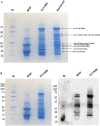Allergenicity reduction of the bio-elicited peanut sprout powder (BPSP) and toxicological acceptance of BPSP-supplemented diets assessed with ICR mice
- PMID: 36276516
- PMCID: PMC9579254
- DOI: 10.1007/s13197-022-05537-7
Allergenicity reduction of the bio-elicited peanut sprout powder (BPSP) and toxicological acceptance of BPSP-supplemented diets assessed with ICR mice
Abstract
The allergenic and toxicological acceptances of the bio-elicited peanut sprout powder (BPSP) have not been assessed. BPSP was generated from peanut kernels germinated at 26-28 °C for 72 h (designated as 72 h-NGS). The 72 h-NGS were subsequently sliced, incubated, dried, defatted and pulverized to generate bio-elicited peanut sprout powder (BPSP). Protein solubility of BPSP increased 2.6-fold compared to 72 h-NGS. SDS-PAGE analysis revealed BPSP production triggered extensive degradation of the high-molecular weight peanut allergic proteins, mainly Ara h 1 and Ara h 3. Western blotting detected with peanut allergic patients' IgE indicated decreased in vitro reactivity. Food safety assessment of BPSP was performed with ICR mice fed with basal (control) and three doses of formulated BPSP-supplemented diets containing 0.11 g (normal), 2.5 g (high) and 25 g (super high) BPSP /kg BW. Animals appeared healthy with steady body weight gain in all groups during the entire 35-day dietary intervention. Hematological and serum biochemical analyses revealed no significant difference among groups. Histopathological examination on the tissue sections of primary organs further supported safety with no pathologies. The in vitro allergic reduction and toxicological safety in the BPSP-supplemented dietary intervention in the ICR mice study, support moving forward with BPSP-involved product development.
Supplementary information: The online version contains supplementary material available at 10.1007/s13197-022-05537-7.
Keywords: Allergenicity; BPSP (bio-elicited peanut sprout powder); BPSP-supplemented diets; Food safety assessment; Peanut; Resverachidins; Stilbenoids.
© The Author(s) 2022.
Conflict of interest statement
Conflict of interestWe declare there is no conflict of interest with any party.
Figures


Similar articles
-
Beneficial Influence of Short-Term Germination on Decreasing Allergenicity of Peanut Proteins.J Food Sci. 2016 Jan;81(1):T255-61. doi: 10.1111/1750-3841.13161. Epub 2015 Nov 30. J Food Sci. 2016. PMID: 26618608
-
The Effect of the Food Matrix on the In Vitro Bio-Accessibility and IgE Reactivity of Peanut Allergens.Mol Nutr Food Res. 2020 Jul;64(14):e1901093. doi: 10.1002/mnfr.201901093. Epub 2020 Jun 29. Mol Nutr Food Res. 2020. PMID: 32420668
-
Allergenic properties of roasted peanut allergens may be reduced by peroxidase.J Agric Food Chem. 2004 Jul 14;52(14):4541-5. doi: 10.1021/jf030808d. J Agric Food Chem. 2004. PMID: 15237964
-
Proteomic screening points to the potential importance of Ara h 3 basic subunit in allergenicity of peanut.Inflamm Allergy Drug Targets. 2008 Sep;7(3):163-6. doi: 10.2174/187152808785748182. Inflamm Allergy Drug Targets. 2008. PMID: 18782022 Review.
-
Final report on the safety assessment of Peanut (Arachis hypogaea) Oil, Hydrogenated Peanut Oil, Peanut Acid, Peanut Glycerides, and Peanut (Arachis hypogaea) Flour.Int J Toxicol. 2001;20 Suppl 2:65-77. doi: 10.1080/10915810160233776. Int J Toxicol. 2001. PMID: 11558642 Review.
Cited by
-
Effects of Different Cooking Methods on Phenol Content and Antioxidant Activity in Sprouted Peanut.Molecules. 2023 Jun 10;28(12):4684. doi: 10.3390/molecules28124684. Molecules. 2023. PMID: 37375239 Free PMC article.
References
-
- Arora MK, Strange RN. Phytoalexin accumulation in groundnut in response to wounding. Plant Sci. 1991;78:157–163. doi: 10.1016/0168-9452(91)90194-D. - DOI
-
- Chang JC, Lai YH, Djoko B, Wu PL, Liu CD, Liu YW, Chiou RY-Y. Biosynthesis enhancement and antioxidant and anti-inflammatory activities of peanut (Arachis hypogaea L.) arachidin-1, arachidin-3, and isopentadienylresveratrol. J Agric Food Chem. 2006;54(26):10281–10287. doi: 10.1021/jf0620766. - DOI - PubMed
-
- Cheng P-H, Chiu P-C, Chang J-C, Lin S-M, Li Y-J, Lo D-Y, Lai L-R, Wu S-C, Chiou RY-Y. Inhibition of testosterone-mediated benign prostatic enlargement of orchiectomized Sprague-Dawley rats by diets supplemented with bio-elicited peanut sprout powder (BPSP) and three new BPSP-extracted natural compounds identified. J Funct Foods. 2021;79:104383. doi: 10.1016/j.jff.2021.104383. - DOI
LinkOut - more resources
Full Text Sources
